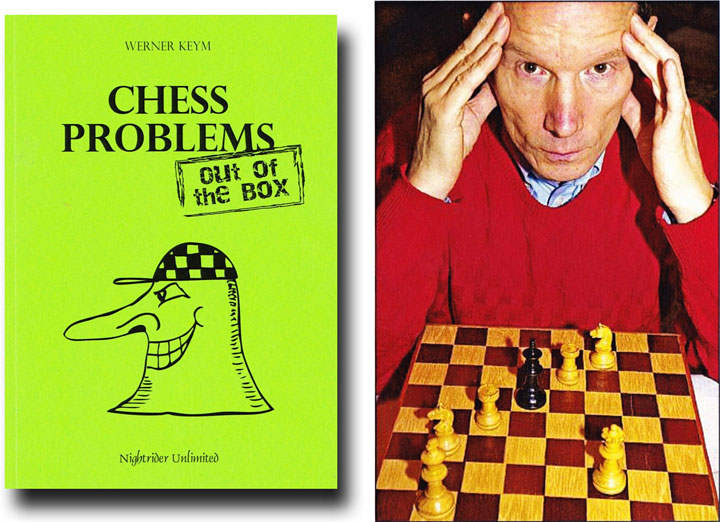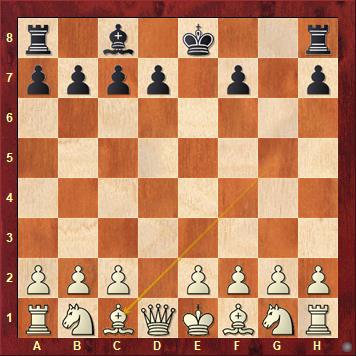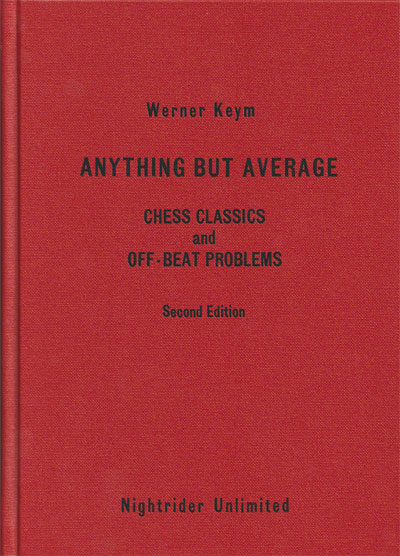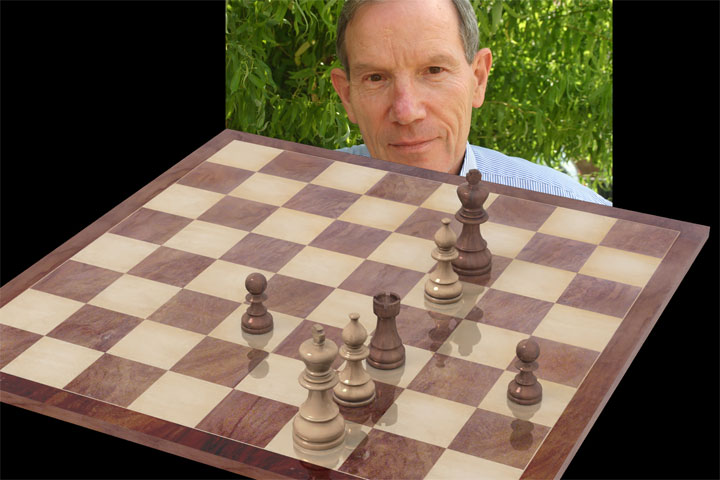Today he turns eighty – and Werner Keym noted the palindrome in the date: 22.02.2022 can be read backwards and forwards. The next time we see a palindromic date will be on the third of February 2030. He never fails to spot such oddities.
Werner Keym specializes in problems involving castling, en passant captures and pawn promotion. For many years I have enjoyed his problems, and his chess humour. Also his meticulous quest for accuracy.

For decades Werner Keym has published studies and chess problems. The focus is "out of the box" problems: en-passant capture, rotation, adding pieces, retro puzzles, text problems, proof games, special stipulations, jokes etc. for which he is a leading specialist. I have helped with comments and suggestions for his books – and with proof-reading. In return for this "service" I am allowed to show you examples from them ad libitum, on our news page, together with his notes and comments. The book is no longer in print, but you can read it or download the full PDF, absolutely free of charge, from the Schwalbe website here.
And now, to celebrate his 80th birthday, here are a few examples from his recent book ("Anything but Average,"link and purchase option at the end of this article):
The above problem was composed 56 years ago and appeared in the Allgemeine Zeitung Mainz. It is quite remarkable, as you will soon see. The position is truly symmetrical, and for any key move, White would have a mirror move on the other side. So there are two questions: how can White secure a draw in the above position; and why does the mirror solution not work?
In the above diagram we have switched on the engine, so you can actually play out the position against the computer, making sure it does not simply win with Black. Have fun!
This unique problem makes all four castlings an integral part of the solution. In each case not castling will allow a quicker mate. We believe that this has never been shown before.
This is an insidious problem you should try to solve on the diagram:
There are five tries, each with precisely one refutation (which the diagram engine will play against you). You will not be able to mate in three unless you play the correct key move. To find it you should look at the position carefully – and think out of the box!!
The next problem is a "proof game": you are asked to start from the initial position and reach the position below after White's seventh move:

You can try to do so on the following diagram (where you can move pieces):
Hint: there are six black pieces missing, so White must have captured six times!
In similar vein, Werner Keym draws attention to these two historical king-only proof games:

Sam Loyd: proof game in 17 – François Labelle, proof game in 20
The first was published in 1895 by Sam Loyd. Starting from the initial position you should reach the position on the left (wKe2, bKe7) in 17 moves. Loyd's problem had multiple solutions, but at least the position displayed could not be reached in fewer moves.
How about the requirement of having a unique solution, one in which every move and the move order is forced? Numerous unsuccessful attempts were made until 2012 – there were always duals. In 2004 the Canadian mathematical chess explorer François Labelle undertook a monumental computer search, performed over eight years, and then published the first dualfree proof game resulting in bare kings! The position on the right (wKe5, bKe2) can only be reached in 20 moves – actually 19.5 moves, since it ends with 20.Kxe5. Labelle's composition was published in the April - June 2012 issue of the US chess problem magazine StrateGems.
Now we don't want our readers spending the next years trying to solve these proof games, so here are the solutions. Loyd's moves are not unique, Lasalle's absolutely so. You might at least enjoy playing through the "massacre games" that lead to the bare kings.
The solutions to all puzzles will be provided next Sunday. Until then happy solving!
 Anything but Average, from which the above puzzles were taken, is a chess book aimed at all chess lovers: players and problemists. We quote from the preface:
Anything but Average, from which the above puzzles were taken, is a chess book aimed at all chess lovers: players and problemists. We quote from the preface:
Over-the-board chess and chess composition complement each other wonderfully: battle and art. A game is a struggle between two people, a composition is the product of an individual. A chess game lives from mistakes, the chess problem dies from them. A game perfectly played by both sides often leads to a colourless draw, a perfect chess composition is an everlasting source of pleasure. Anticipation or plagiarism is irrelevant for the chess player, for the chess composer it means bad luck or violation.
Details: www.berlinthema.de (including a 24-page excerpt)
Second edition (cloth-bound) 2021. 25 € + postage.
Order per e-mail: Ralf.Kraetschmer@t-online.de





















 Anything but Average, from which the above puzzles were taken, is a chess book aimed at all chess lovers: players and problemists. We quote from the preface:
Anything but Average, from which the above puzzles were taken, is a chess book aimed at all chess lovers: players and problemists. We quote from the preface:




